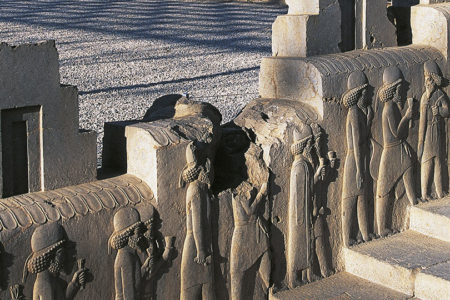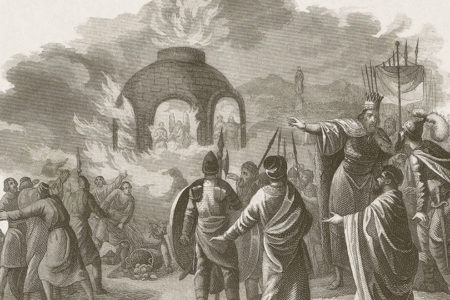A Sure Hope Hebrews 6:9–20
In the previous eight verses of this chapter, the author encouraged new believers to leave Judaism and press on toward maturity in Christ. Failure to do so, he warned, would disastrously affect their spiritual lives. However, he was confident that such would not be the case for a true child of God; thus his warning is offset by an encouraging, positive message.
The Saint’s Position
The author expressed confidence in the steadfast commitment of these believers: “But beloved, we are confident of better things concerning you, yes, things that accompany salvation, though we speak in this manner” (Heb. 6:9). The word beloved sets the tone of this hope-filled message and underlines the author’s affection for these Christians. Beloved is never used to address unsaved people or apostates.
Furthermore, he was “confident [persuaded] of better things concerning [them].” Earlier he had misgivings about their commitment, but now he was convinced they would press on from infancy to maturity in Christ.
God had already witnessed the fruit of their salvation, and He “is not unjust [unfair] to forget” what they have done (v. 10). Verse 10 lists what God will not forget: (1) their “work and labor of love” to the point of exhausting themselves in the Lord’s service; (2) that the purpose of their service was to bring praise and glory “toward His [God’s] name”; and (3) that they did so by faithfully ministering “to the saints.” God would not forget their unselfish service helping others, because He is righteous and fair in rewarding every good deed.
The author again appealed to these believers, encouraging them to continue in their commitment to the Lord: “And [But] we desire that each one of you show the same diligence [earnestness] to the full assurance of hope until the end, that you do not become sluggish, but imitate those who through faith and patience inherit the promises” (vv. 11–12).
This is the same appeal originally made in Hebrews 5:11–14. By showing earnestness in quickly taking to heart the truth they were previously given in Christ, they demonstrated “full assurance” of the salvation hope they possessed. Without being fully persuaded of one’s salvation, an individual lacks stability in his or her walk before the Lord and will not progress toward maturity in Christ. Without settled convictions, people are tossed about by various doctrinal teachings and will eventually fall in their commitment to Him.
Consequently, believers must not “become sluggish” in the faith but must show spiritual diligence by becoming grounded in the truth of God’s Word (v. 12). In so doing, they will possess the hope, or assurance, of salvation; and that hope will carry them “until the end,” or to the day their spiritual pilgrimage on Earth has reached its goal.
Another way to guard against spiritual sluggishness is to “imitate those who through faith and patience inherit the promises” (v. 12). The word imitate means to “mimic, model, or emulate” men and women of faith who were approved by God in Scripture. In Hebrews 11 the author listed people whose faith these believers should emulate. The classic example is the apostle Paul who said, “Imitate me, just as I also imitate Christ” (1 Cor. 11:1). These believers were expected to exercise “faith and patience [endurance],” like those in chapter 11, until they inherited the promises that would be theirs in the Kingdom Age.
The Secure Promise
The author then used Abraham as proof that God’s promises are immutable:
For when God made a promise to Abraham, because He could swear by no one greater, He swore by Himself, saying , “Surely blessing I will bless you, and multiplying I will multiply you.” And so, after he had patiently endured, he obtained the promise (vv. 13–15).
The writer chose Abraham for many reasons: (1) Jewish believers could easily relate to him because they had a vital relationship to him in Judaism. (2) Abraham’s greatness and frequent appearance in Scripture made him a good example. (3) He is considered the father of faith (Gal. 3:16). (4) God’s promises to Abraham were extremely detailed and can be traced through the Bible. (5) God promised and delivered spiritual blessing to the world through Abraham. (6) Abraham is an example of someone who exercised faith and endurance, as he waited many years for God to fulfill His promises. (7) God swore by Himself because He could swear by no one greater, confirming that He would fulfill His promises made to Abraham (v. 13).
When making an oath, a person always vows by a greater power than himself to assure the fulfillment of his oath. In this situation, God condescended to employ the custom of the day. He swore by the greatest authority in the universe—Himself—putting His own integrity, reputation, and honor on the line to guarantee the fulfillment of His promises to Abraham.
Proving his point, the author said, “Surely blessing I will bless you, and multiplying I will multiply you” (Heb. 6:14). This is a quote from Genesis 22:17 where God promised to bless Abraham by multiplying his seed. The fulfillment did not come immediately: “And so, after he had patiently endured, he obtained the promise” (Heb. 6:15). Abraham had to be content to rest in God’s promise until God chose the proper time to fulfill it.
In fact, Abraham was 75 when he received the promise (Gen. 12:4), and Isaac was not born until 25 years later (21:5). It would be another 60 years before his first grandchild would be born (25:26), 15 years before Abraham’s death (v. 7). Yet Abraham was content to endure patiently until “he obtained the promise.” Hebrews teaches believers to emulate his faith. Since God kept His promises to Abraham, He will assuredly keep the promises made in Jesus Christ to those who put their trust in Him.
Disputes in biblical times were often settled by an oath:
For men indeed swear by the greater, and an oath for confirmation is for them an end of all dispute. Thus God, determining to show more abundantly to the heirs of promise the immutability of His counsel, confirmed it by an oath, that by two immutable things, in which it is impossible for God to lie, we might have strong consolation, who have fled for refuge to lay hold of the hope set before us (Heb. 6:16–18).
This passage stresses the importance of an oath. Over the centuries, the veracity of a person’s testimony in a court of law has been validated using oaths. In years gone by, in an American court of law, a person about to testify was requested to place his left hand on a Bible, lift his right hand, and swear to tell “the truth, the whole truth, and nothing but the truth, so help me God.” The individual was swearing by an authority higher than himself, and the highest authority is God. He was guaranteeing the truthfulness of his testimony and invoking God as his witness.
God had no need to make an oath. His say-so would have been sufficient. But He went a step further and “confirmed it by an oath” (v. 17). He thus condescended to mankind’s level to prove without any doubt that He will unconditionally and without reservation fulfill His promises to Abraham. His oath stresses the volition of His will and the “immutability of His counsel” (v. 17). Here God is both the giver and guarantor of the promise He made not only to Abraham but also the “heirs” (v. 17) of Abraham’s physical seed. Since God’s counsel is immutable, His promises will be fulfilled.
God swore the oath based on “two immutable things”: the promise and pledge (v. 18). First are the unconditional, immutable promises He gave Abraham in Genesis 12:1–4 and 15:1–6. Second is God’s confirmation of the pledge when He vowed to fulfill the oath made to Abraham by a covenant in Genesis 15:7–21. The promise and pledge are immutable because fulfillment is based totally on God’s character. They are fully trustworthy because they are based on the truthfulness of God’s eternal Word, and “it is impossible for God to lie” (v. 18).
These facts provided not only a “strong consolation [encouragement]” to Abraham but to all believers “who have fled for refuge to lay hold of the hope set before [them]” (v. 18). The phrase fled for refuge refers to one of the six Israelite cities of refuge where people could flee for protection if they accidentally killed someone (Num. 35). In like manner, believers may flee, or “lay hold of,” refuge in Jesus Christ for salvation and protection, which is their “hope.”
In God’s Word, hope is never a wish but a settled confidence and conviction possessed by those who rest in the promise of salvation granted by God. In context, this hope is the settled confidence each believer may acquire through spiritual maturity in Christ.
The Steadfast Pledge
The author abruptly changed his figure of speech from a city of refuge to an anchor. Jesus is the believer’s “anchor of the soul, both sure and steadfast, and which enters the Presence behind the veil, where the forerunner has entered for us, even Jesus, having become High Priest forever according to the order of Melchizedek” (Heb. 6:19–20).
An anchor secures a ship from drifting. Believers are securely anchored in Christ. And though life’s storms beat against him, they can never destroy a believer’s position before God in heaven. His soul is securely anchored in God’s inner sanctuary, the safest location in the universe. Jesus has entered “behind the veil” into the inner sanctuary of God’s presence in heaven. Christ tore the veil away through His death on the cross, making it possible for us who believe to come boldly into God’s presence (4:16).
Christ is not only our “forerunner” in heaven, but our High Priest as well (6:20). He inaugurated (opened for the first time) a “new [newly slain] and living [life-giving] way” for people to come with “boldness” (confidence) into God’s presence (10:19–20). Through Christ, a believer’s hope is safely and securely anchored in heaven.
Thus the author concluded his argument on maturity by returning to the major theme of chapter five: that Jesus is a “High Priest forever according to the order of Melchizedek” (6:20).








I’m so blessed by this commentary surely Jesus is our anchor. We are not to fear hope in him, makes us not ashamed
Dave, we’re very thankful that FOI has these archives on your Hebrews studies; I taught on Hebrews in my chaplancy work in Inman, KS; now my wife Carol is being taught by one of the women at church. Also, I found that your study on the believer’s rest (chapter 4) to be very helpful.
Dave Denlinger